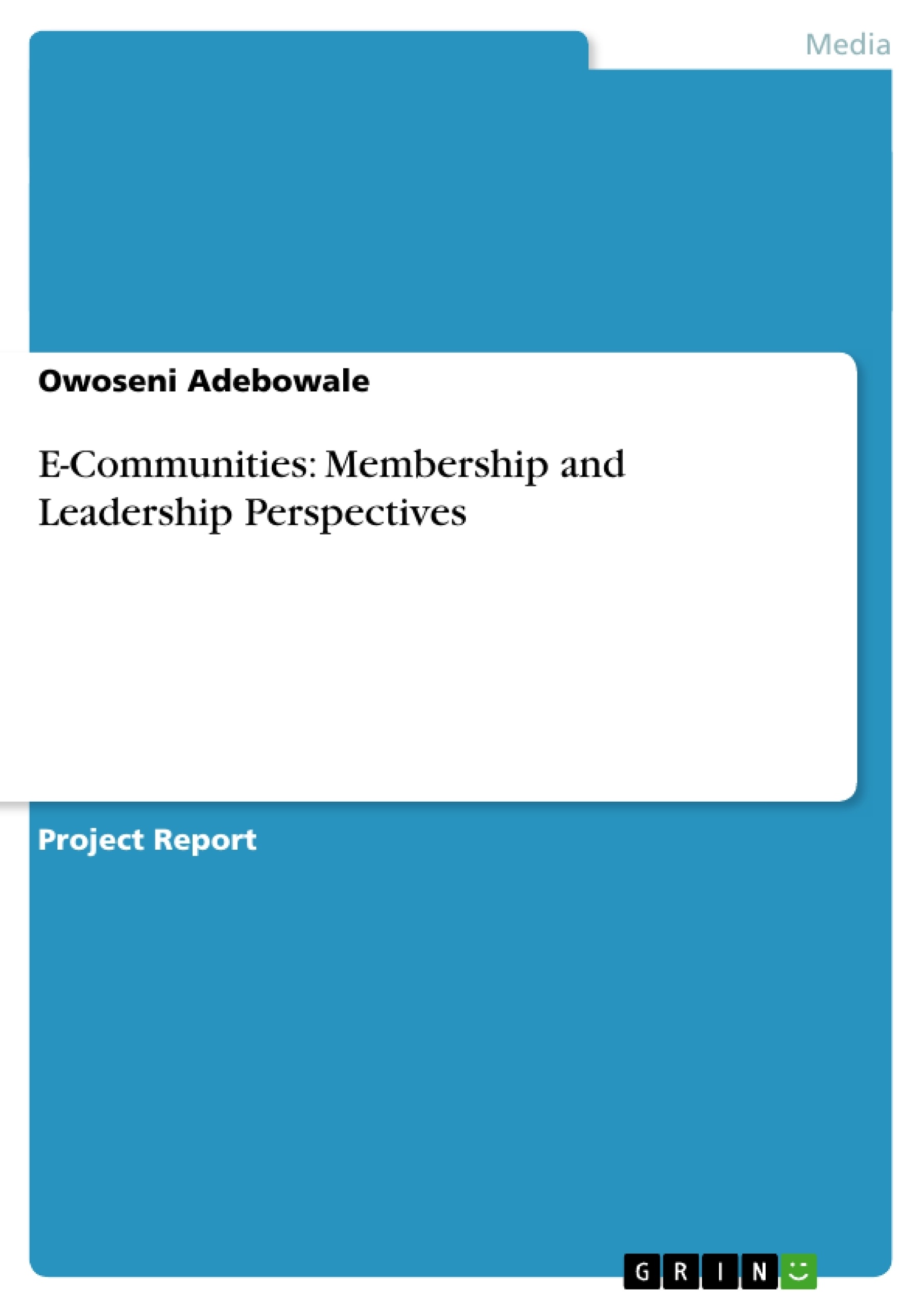Excerpt
Abstract
This write-up reports a study of e-community from two perspectives. 1) Membership perspective as a member of two e-communities: GRIN publishers [2] and Nairaland [4]. 2) Leadership perspective as a creator and moderator of e-communities [5, 6, 7, 8]. I participated in the activities of GRIN and Nairaland over a period of time and learned their interaction model. Subsequently, I created two e-communities with the intention of putting to practice few things I have observed and learned as a member of existing e- communities. Some guidelines were suggested towards creating a successful online community.
1.0 Introduction
Encyclopedia dictionary defined e-Community as a group of individuals who share a common interest via e-mail, blogs, instant messages, chat rooms or newsgroup [1]. Wikipedia defined virtual community as a social network of individuals who interact through specific media, potentially crossing geographical and political boundaries in order to pursue mutual interests or goals [10]. Wikipedia further defined online community as a virtual community that exist online [1].
Taking a look at these definitions and views of other researchers, Virtual community, online Community and e-Community are synonymous to one another. They have very similar characteristics, they are virtual, borderless, goal oriented and controlled:
1. Virtual: They are built on a set of infrastructure like network, internet and other communication artifact
2. Borderless : There are no geographic or political boundaries that demarcates territories, time zones and locations
3. Goal Oriented: Members have mutual interest and pursue same or similar goal
4. Controlled: They have voluntary membership, membership are usually not inheritable by birth or colony. They governed by laid down rules and principles.
In carrying out this study, I joined two e-communities: GRIN Publishers [2] and Nairaland [4]. I participated in the activities of these communities over a period of time and learned the interaction model. Subsequently I created e-community with the intention of putting to practice few things I have observed and learned as a member of GRIN and Nairaland. The remaining part of this write-up narrates my findings and recommendations.
2.0 Interacting with existinf e-Communities
Sometime you do some things without even knowing! It is interesting to suddenly realize that I have been an active member of number of e-communities without conscious knowledge of my actions; facebook, twitter, phbTownhall (internal blogging tool at workplace), itslearning, CodeProject [9] etc are good examples. Recently I joined GRIN and Nairaland.
GRIN is an online community of publishers, uploading wide-range of literatures on the internet for free or sale. It is a knowledge centre for researchers and free readers. Nairaland is the largest online community of Nigerians; it is a blogging tool with broad categories of discussion themes and topics. At the moment GRIN has 49,888 authors, 118,643 e-books, 1,939,648 textbooks (also available in soft copies) covering 101 subject areas and Millions of Users [2]. Nairaland has 664,670 members and 577,710 discussion topics [4].
From my interaction in e-communities, I have developed the following set of e- community assessment criteria in questions format:
- What is the goal and objective? : There should be a reason behind every action. This question addresses the goal of the community and how it will be achieved. The goal is usually envisioned by the creator of communities; it varied from community to community and it often informs other assessment areas.
- Who are the target group? : This explains the target membership of an e- community; CodeProject was has programmers as its primary members while GRIN has publishers as main members.
- What is the Control model? : The control model is set of tools targeted at effectively monitoring and controlling the activities of community members. These tools include access rights, role definitions, exception reporting etc
- Quote paper
- Owoseni Adebowale (Author), 2011, E-Communities: Membership and Leadership Perspectives, Munich, GRIN Verlag, https://www.grin.com/document/170314
Publish now - it's free






















Comments